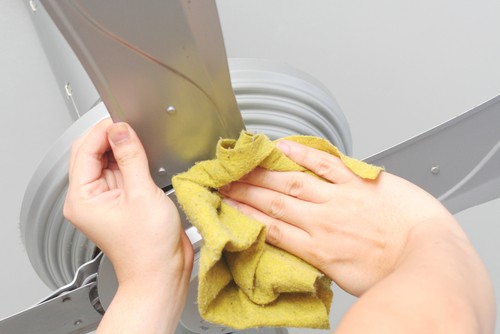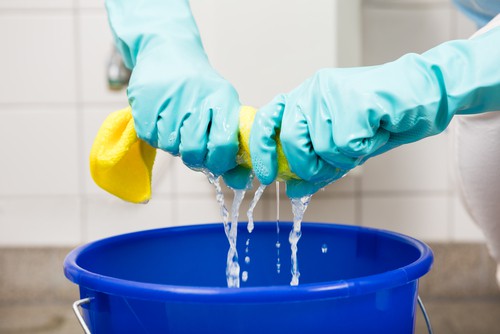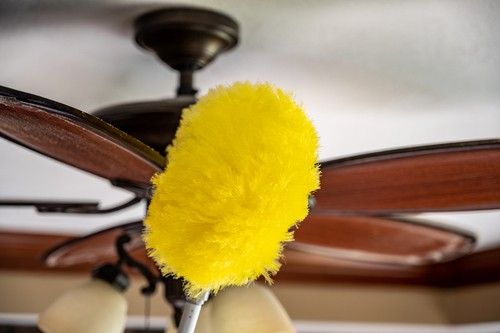What Happens If I Don’t Clean Ceiling Fan At Home? A ceiling fan is one of the things most people skip over when cleaning the house. For someone, it’s a too meticulous task that takes time and tires them out by making them look permanently upwards.
Others are lazy carrying a ladder or a chair around. In any case, leaving the fan with no attention can lead to unpleasant consequences. Read on – What Happens If I Don’t Clean Ceiling Fan At Home? to know the risks of not cleaning the ceiling fan, and get a detailed guideline for sanitizing this device.
What happens if you don’t clean a ceiling fan?

Poorer air quality
Like any other item in the house, a ceiling fan is susceptible to accumulating dirt. Dust, bacteria, and dust mites get on the device over time. Dust on the wardrobe or PC desk can’t spread throughout the house, staying there until you wipe it off. This doesn’t happen with a ceiling fan dirt, though.
When the blades of the fan start to spin, they spread a part of the accumulated dust around. The air becomes contaminated and affects your respiratory system when you inhale it.
The level of air contamination depends on what nasty agents have resided on the fan before spreading. Dust affects breathing, yet it poses fewer risks to your health than other contaminants do. Dust mites are more dangerous than dirt particles.
If you are allergic, it can trigger several symptoms that will affect your work productivity and sleep quality. These include a stuffy nose, itchy skin, difficult breathing, fever, and watery eyes. Inhaling dust mites can also lead to bronchitis and other respiratory system conditions.
Finally, another harmful agent that lives on the ceiling fan is bacteria. Since ceiling fan doesn’t experience traffic as carpet or door handles do, you may think germs don’t accumulate on it. However, there are other ways dirt and bacteria can get on the air conditioning unit.
For example, contaminants may enter your house through the open window and land on the fan surface. Also, high humidity levels represent a breeding ground for the growth of mold and mildew.
Worse fan operation
Besides contaminated air and health risks, neglecting cleaning the ceiling fan leads to consequences affecting the operation of the device. The layers of dirt that get on the blades make them heavier and put a burden on the motor. Here several bad things happen.
First, the blades rotate slower, hence, they cool the air not as they should. A worsened performance of the fan should be a sign for you that there is too much dust on it.
It’s important to understand that slower spinning blades don’t mean a motor working on a lower intensity. On the contrary, the motor will operate to its limit to make the heavy fan rotate. This will directly affect your electricity bills, making you pay more than you have been used to.
Moreover, an engine working under pressure will sooner or later give up. So, if you keep neglecting the heavy dirt torturing the fan motor, be ready to pay for repairs shortly.
How to remove dust from the ceiling fan?

Removing dust from a dirty ceiling fan is not rocket science. First of all, place a ladder or a chair under the fan. Make sure it’s not wobbling before getting on it.
Prepare a mixture of warm water and detergent soap. Dip a microfiber cloth into the soapy water, wring out the excess moisture, and start dusting the fan blades and base. Rinse the cloth after each blade. Avoid applying heavy force, as it may damage the feeble structure of the fan.
How to get rid of dust mites?

Since prevention is the best solution, you are good to take measures to prevent the accumulation of dust mites on the fan. These tiny culprits thrive in high humidity conditions. That’s why make a point of installing a dehumidifier in the room to reduce the humidity levels to 50%.
Such an environment minimizes the chance of survival of dust mites. The thing is it’s hard to tell if you have these invisible monsters in your house unless you are allergic to them. With that in mind, cleaning the surfaces against dust mites is a wise decision.
A good helper in this case is baking soda. Sprinkle some of it on the fan blades, and let it sit for 20-30 minutes. Keep an eye on your kids to prevent them turn on the fan. Vacuum the soda, being sure it has killed all potential colonies of dust mites.
You can also tackle mites with a steam cleaner since they are vulnerable to high temperatures. Avoid, though, applying steam on the base of the fan where the electric motor is located.
How to kill germs?

Whether it’s invisible or visible germs, disinfecting the ceiling fan once a month is necessary. You can use that as a steam cleaner or disinfectant. If you want to avoid store-bought disinfectants, you can create a homemade one. Mix 1 part baking soda with two parts vinegar.
Apply the paste on the blade and gently rub it with a cloth. Hold the edge of the blade with another hand to keep it from bending. Let the paste sit for half an hour, then rinse.
Another way of making a DIY disinfectant is by mixing 1 part bleach with 9 parts water. Dip a cloth in the solution and run it across the fan.
Make sure the cloth is damp and doesn’t contain excess moisture. Don’t forget to address both sides of the blades. While homemade bleach is less harsh, wearing protective equipment while working with it is still a must.
What Happens If I Don’t Clean Ceiling Fan At Home? – Conclusion

The ceiling fan requires cleaning and disinfection as any other things in the house do. If you neglect it during your cleaning sessions, it will become a hub of dust, dust mites, and bacteria. Being spread throughout the house by the rotating blades, they spoil the quality of air.
As result, you and your family members are at risk of feeling unwell and catching the disease. Another motivation to clean the ceiling fan is the increased power bill and higher risk of fan breakdown.
